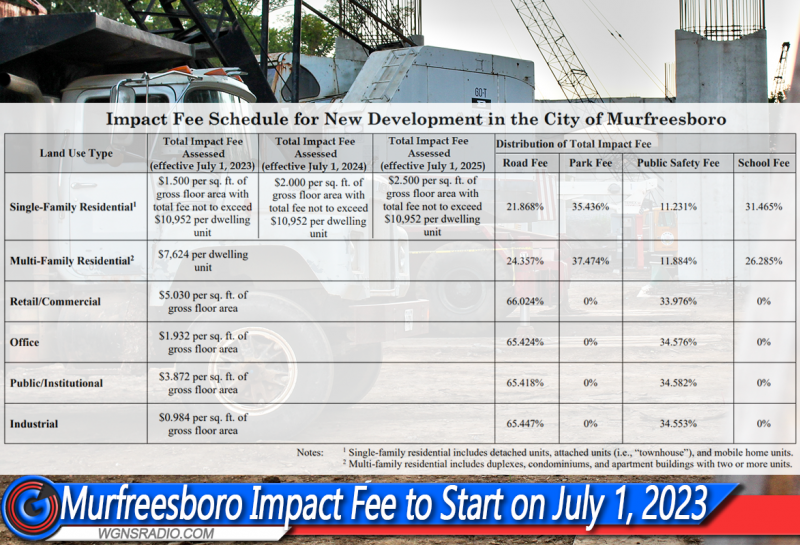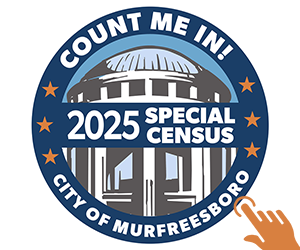MURFREESBORO, Tenn. — The Murfreesboro City Council voted Thursday, June 15, 2023, on 2nd Reading, to implement a Fee Schedule with a newly adopted set of Development Impact Fees to help pay for infrastructure projects as the result of population growth and development in the City.
Murfreesboro Assistant City Manager Sam Huddleston told WGNS the impact fee for single family residential developments will be... As for the cost to build a new apartment complex, developers can expect to pay a per unit fee, as opposed to a per-square-foot fee...
On May 25, 2023, City Council held a Public Hearing and voted to approve the proposed Fee Schedule on First Reading. City Council had previously adopted a Development Impact Fee Ordinance. The Fee Schedule sets the Development Impact Fees to be imposed on new development to offset the cost of public capital improvements in four major areas: roads, parks, public safety, and schools. Several other Middle Tennessee cities and counties have long had impact fees to help pay for new development.
Mayor Shane McFarland said there is an abatement clause within the ordinance...
“The City Council worked with consultant Tishcler Bise Inc. since 2019 to study and develop appropriate Impact Fees that help support infrastructure needs resulting from growth,” said Assistant City Manager Sam Huddleston. “The Impact Fees will help offset the costs associated with new development by providing a source of revenue in the City budget to expand or enhance infrastructure and services incurred as a result of new development.”
Tishcler Bise followed a prescribed methodology to determine the impact fee per residential unit and for non-residential projects a per 1,000 square feet impact was calculated. Impact Fee revenue can only be used for capital expenses that are incurred in response to growth and development—new or expanded schools, parks and recreation facilities, street or roadway, or new public safety facility or equipment or similar projects.
The Development Impact Fee becomes effective upon the start of the new Fiscal Year, July 1, 2023. Developers, homebuilders, and stakeholders will notice the Fee Schedule on building permits by land use. Permit applications for single family residential construction received by June 30, 2023, will be exempt from the fee as will projects with Site Plans approved before July 1, 2023.
Based on recent building activity, the Development Impact Fee is anticipated to generate approximately $9 million in revenue annually:
- For Roads & Streets $3.5 million;
- Parks & Recreation $1.75 million;
- Public Safety $1.75 million;
- Schools $1.75 million.
Council voted to adopt a graduated Fee Schedule for single family residential beginning on July 1, 2023, at $1.50 per square foot, increasing annually by .50 cents per square foot on July 1, 2024, and capping at $2.50 per square foot in 2025.
COSTS: Impact Fee for Single Family Residential:
- Starting July 1, 2023: $1.50 Per Square Foot
- Increases to $2.00 Per Square Foot on July 1, 2024
- Increases to $2.50 Per Square Foot on July 1, 2025
Tax Limit - While the Impact Fee is charged per-square-foot on residential construction, there is a ceiling for the tax. For Single Family Residential construction, the cost of the Impact Fee will not exceed $10,952 per dwelling unit. This year, that would be the same as charging $1.50 per square foot if the future homeowner were building a 7,301 square foot home. Next year, that would be equal to someone building a 5,476 square foot home. In 2025, that Impact Tax limit would be equal to a builder constructing a 4,380 square foot home.
Example of how the Impact Fee will Effect Single Family Construction:
- Cost to Build 2,500 Square Foot Home on / after July 1, 2023: $3,750
- Cost to Build 2,500 Square Foot Home on / after July 1, 2024: $5,000
- Cost to Build 2,500 Square Foot Home on / after July 1, 2025: $6,250







